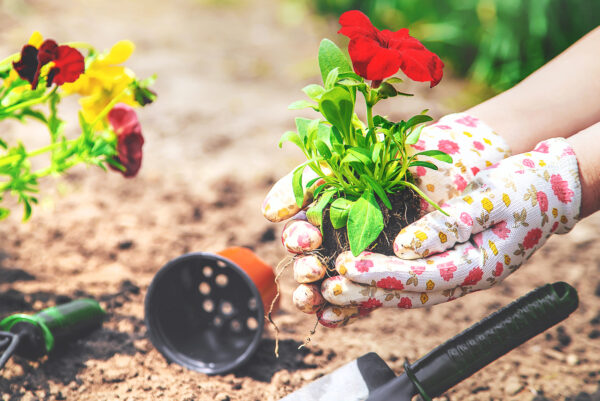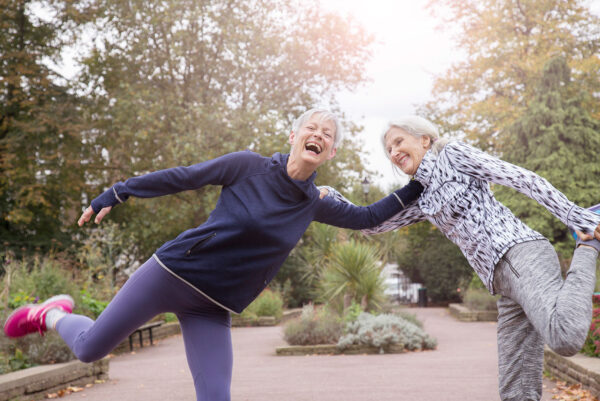
This biweekly column is sponsored by The Mather in Tysons, Virginia, a forward-thinking Life Plan Community for those 62 and better.
When The Mather, a Life Plan Community for those 62 and better, opens in Tysons in 2024, its modern apartment homes — some up to 3,300 square feet — will offer a great canvas for residents to decorate. With expansive views, open floor plans, and elegant fixtures, the homes are a dream for interior designers and those who love to refresh their décor.
Current design trends are fun and expansive, yet practical. Maximalism is bigger than ever, new textiles are a game-changer, retro is popular (again), and we all want a lighter environmental footprint. Here’s an overview of what’s hot in interior design:
1. Maximalism still going strong. While midcentury modern furniture is here to stay for a while, the maximalist trend of opulent, lush décor featuring layers of sumptuous textures has grown in popularity. Instead of clearing out a lot of your older pieces, the new trend seems to be, if it gives you joy, keep it — only make it bright, to bring happiness in!
Those who prefer minimalism can keep their pared-down décor, but have fun incorporating a bit of maximalism with a single grouping of small items on a mantel or side table, or a short wall devoted to an eclectic art collection.
2. High-performance fabrics changed everything. Manufacturers are creating upholstery and other fabrics that look like velvet and linen but can withstand a lot of wear and tear. So you can have a white sofa, for example, without worrying about how it will hold up. The variety is amazing — even faux-distressed fabrics — and you can layer them for that maximalist look. Unlike older manufactured fabric, these are soft and comfortable.
3. The 70s are back! Designers are having fun with 1970s colors and patterns. Current design is using a lot of retro earth tones, especially browns and golds, paired with deep blue, and geometric and basketweave patterns.
4. Reduce, reuse, recycle. A lighter environmental footprint is important to people today, so it’s “in” to use recycled and repurposed furniture. Rather than buying replacement furniture, hold onto pieces that are meaningful to you. You can use them as accents to your new decor. Think beyond painting — you can reupholster chairs or sofas, change out chair or table legs, and update hardware on drawers.
While these trends are fun and offer diverse options, keep in mind you are not obligated to follow any of them. Your home should be a reflection of who you are and what makes you happy.
The Mather in Tysons, VA, for those 62 and better, is a forward-thinking Life Plan Community that defies expectations of what senior living is supposed to be. It opens in 2024.

This biweekly column is sponsored by The Mather in Tysons, Virginia, a forward-thinking Life Plan Community for those 62 and better.
Volunteer work is a wonderful use of your time. Doing something worthwhile for others offers a wealth of benefits to your own well-being, from keeping you mentally and socially active to strengthening your sense of purpose and satisfaction with life.
When The Mather, a Life Plan Community for those 62 and better, opens in Tysons in 2024, it will be home to some dedicated volunteers. One of them is Bob Fall, who dedicates approximately 30 hours a week during basketball season as an assistant coach for the girls’ varsity team at Langley High School.
Bob has served as one of two assistant coaches on the team for eight years. “I did this while I was still working a ‘real job’ — I’m not sure how I did that!” he says. “We have to do a tremendous amount of prep work. I watch a heck of a lot of film of the teams we play, as well as our own team.”
He enjoys the camaraderie with the other coaches, and the energy of the kids. “This is a particularly satisfying experience, because I’m part of a small, stable coaching staff that works well together,” he says. “And it’s a very energetic atmosphere to be in a gym with 12 teenage girls. There’s a lot of intensity — it keeps me young. It’s just fantastic.”
Staying Local
Currently living in Annandale, Bob and his wife Helen have lived in the area since he went to law school at George Washington University. He worked at the Freddie Mac headquarters, close to The Mather’s location. “I used to jog past The Mather’s future site on my lunch hour,” he says.
As they prepare to move to Tysons, Bob says, “I’m looking forward to joining a community in which I know there will be a lot of activities, and opportunities to be with interesting people, with learning opportunities all the time.”
Benefits of Volunteering
Interestingly, some volunteer activities may be better than others when it comes to life satisfaction. Research from Mather Institute looked at different formal and informal volunteer activities and found that many older adults could increase their life satisfaction by choosing formal activities, generally done through an organization, as opposed to informal activities like helping out a neighbor or friend.
Mather Institute is the research area of Mather, the parent organization to The Mather. The Institute is an award-winning resource for research and information about wellness, aging, trends in senior living, and successful aging service innovations.
“In our study on ‘the value of volunteering,’ we found that not all opportunities offer the same psychological benefits,” says study author Nicole Lehpamer, PhD, senior research associate at Mather Institute. The study reveals that volunteer activities most likely to increase your life satisfaction include:
- Fundraising
- Mentoring youth or tutoring and teaching
- Collecting, preparing, serving, or distributing food
- General labor (like cleaning up a public park)
Want to find a volunteer opportunity that will maximize your life satisfaction? Start by looking at local community groups, schools, or places of worship for formal volunteer opportunities like those listed above.
The Mather in Tysons, VA, for those 62 and better, is a forward-thinking Life Plan Community that defies expectations of what senior living is supposed to be. It opens in 2024.

This biweekly column is sponsored by The Mather in Tysons, Virginia, a forward-thinking Life Plan Community for those 62 and better.
A multitude of research shows that those who spend time planting or cultivating a garden can end up reaping a variety of health benefits for the mind, body, and spirit. This is good news for avid gardeners in the D.C. area, many of whom are transplants themselves from other parts of the United States.
A Passion for Plants
Lou Marotta had never set foot in Virginia before he moved here with his husband Michael after retiring from a career in interior design. A long-time gardener, Lou says, “I gradually went from being a doer — digging, moving things around, and getting my hands in the dirt — to becoming a creator. I think about the color and texture of a garden, and create composition. It’s been a 40-year transition.”
Lou says he and Michael plan to move from the farm to The Mather, a Life Plan Community for those 62 and better, when it opens in Tysons, Virginia, in 2024. “I’m a city person and will be happy to get back to that environment — though I love the idea of The Mather’s three-acre garden,” he says. “We’re looking forward to moving to a sophisticated community with like-minded people. And, of course, there are practical factors, like health care.” The Mather provides residents with health care services, should the need ever arise.
Another gardener moving to The Mather is Lavona Grow, who has a special passion for native plants and pollinators. “I feel it’s part of my job to plant what birds and butterflies and bees want,” she says. “In fact, before we move to The Mather next year, I’m hoping to get our yard certified as a wildlife habitat.”
Lavona has planted her Arlington yard with goldenrod — “It looks great in autumn,” she says — New York asters, lungworts, dwarf iris, a serviceberry tree, and some redbud trees. She adds, “I like to use pots, because you can move them around and change them out. I like to play with colors.”
Whether planting perennials in pots or sowing seeds in soil, working with plants is good for you.
A Bouquet of Health Benefits
Multiple studies show that gardening is an ideal way to cultivate good health:
Stress relief: Dutch researchers found that gardening fights stress better than other hobbies. In their study, participants who gardened outdoors reported better moods and tested for lower levels of the stress hormone cortisol than those who spent time reading.
Physical activity: Gardening may not burn a lot of calories, but activities like digging and weeding are wonderful forms of low-impact exercise. The stretching and repetitive movements are good for those who may not be able to exercise more vigorously.
Healthy diet: A University of Florida study found that people who learn to garden as children or young adults are far more likely to eat the recommended five daily servings of fruits and vegetables, and far more likely to enjoy them.
Mood boost: Researchers found that people diagnosed with depression who spent six hours a week gardening showed a measurable improvement in their depressive symptoms; this trend continued for three months after the gardening program stopped.
Lavona strongly believes in these benefits and more: “It’s good exercise, and I do believe it’s a mood booster. I think the physical aspect of gardening is a stress reliever, and it can even get a little spiritual, thinking about the interconnectedness of life,” she says.
The Mather in Tysons, VA, for those 62 and better, is a forward-thinking Life Plan Community that defies expectations of what senior living is supposed to be. It opens in 2024.

This biweekly column is sponsored by The Mather in Tysons, Virginia, a forward-thinking Life Plan Community for those 62 and better.
Want an enjoyable pastime that sparks creativity, stimulates your brain, and creates good memories? Pick up a camera!
Photography can be as simple or as challenging as you want to make it, and whether you try a creative slant or get practical about recording the people and events in your life, you’ll find it can become a fascinating pastime with myriad benefits for your well-being.
Local Focus
For Robin Kent, photography is a full-time endeavor, a community, and a second career of sorts. “The main thing I’m known for is Washington, D.C.’s federal area, because it’s close. My preferred landscape — such as country found in the Pacific Northwest — is not close,” he says. “But here, the buildings are my mountains, and the fountains are my waterfalls.”
Robin and his wife Laurie are planning to move to The Mather, a Life Plan Community for those 62 and better, when it opens in Tysons, Virginia, in 2024. “Once we move in, it seems it’s going to be a problem of what to choose to do there rather than finding something to do — there will be plenty of programs,” says Robin. “A lot of informal groups are starting already — Laurie is in a fiber arts group that meets monthly. I’ll probably coordinate with other artists there.”
The Mather will incorporate a focus on creativity as an integral part of Aging Well, and will have plenty of opportunities for residents to engage with art and creativity on-site through classes, collaborative Open Art Studios, and partnerships with local museums and galleries.
Early Exposure
He grew up working in his family’s Florida photography store and learned “just about everything” about film, but opted to follow a different career path. “Then, after I retired, I went straight out to California to take a one-week workshop with a famous landscape photographer named Galen Rowell,” he says. “I still use what I learned in that workshop.”
Robin has developed a following, particularly for his stunning twilight shots of D.C. “At this point of my life, I want to shoot what I want to and when I want to,” he says. “I do sell some of my work; I’ve had agents and worked with an art consultant, and I exhibit. I belong to Great Falls Studios, a consortium of about 90 artists, and we hold an annual studio tour every October.”
Picture-Perfect Brain Benefits
Like other creative pursuits, photography offers many benefits for mood and general well-being, along with the potential to improve several areas of brain health:
- Cognition. Researchers have found that photography has “high-cognitive demand,” regularly stimulating the brain and providing long-term cognitive benefits. One study found that participants who used digital photography showed improvements in episodic memory and reasoning skills.
- Mindfulness. Viewing the world with a photographer’s eye offers moments to slow down and focus on the present. There is even a meditative practice called mindfulness photography, which includes a focus on emotions, gratitude, and sharing photos with others. “When you’re walking around with a camera, you look at things. You tend to notice more,” says Robin.
- Connection to others. Other research shows that photographers who share their work in person or online report improved self-care, interaction with a community, and the potential for reminiscence.
Robin adds, “There’s also a physical component to photography: I have to carry about 20 pounds of gear around, and there’s a lot of walking. And the main thing is, it gets you outdoors.”
The Mather in Tysons, VA, for those 62 and better, is a forward-thinking Life Plan Community that defies expectations of what senior living is supposed to be. It opens in 2024.
This biweekly column is sponsored by The Mather in Tysons, Virginia, a forward-thinking Life Plan Community for those 62 and better.
If you’re going to enjoy a lifelong hobby, you can’t beat the benefits of playing a musical instrument. In addition to bringing joy to yourself and any listeners you might have, you’re doing great things for your brain.
“I think playing music is a unique art form. It’s creative, offering an opportunity to create as you go, and at the same time, it’s analytical and almost mathematical,” says Peter Cahn, who plays guitar. “And as far as I’m concerned, it’s a group activity.” Peter enjoys playing music with others, trying out different songs and arrangements. He has played regularly with the same group for 14 years, and is looking forward to playing with other residents of The Mather, a Life Plan Community for those 62 and better, when it opens in Tysons, Virginia, in 2024.
“I want to meet other musicians when we move into The Mather, explore different genres, and see what we can do,” he says.
Noteworthy Brain Benefits
One thing the musicians at The Mather can do is enjoy multiple benefits for their brains. That’s because playing an instrument simultaneously works different sensory systems in the brain, along with your motor skills. This coordination of efforts provides a workout for your brain — the kind of workout that strengthens connections within the brain and keeps you mentally sharp. In turn, this can improve your memory and cognition — one study showed that musicians perform better on cognitive tests than those who don’t play an instrument.
Then there is the benefit of learning; even accomplished musicians continually learn new songs and new arrangements. “As you progress in music, your horizons broaden; the amount to be learned seems limitless, especially in jazz,” says Marie Himel, another future resident of The Mather. Marie plays flute and tenor saxophone. “I’ve yet to meet a jazz musician who is satisfied with where they are. The art can be taken in so many directions.”
In fact, musical training has been proven to increase gray matter volume in specific brain regions and strengthen the connections between them. Other research has shown that such training can improve long-term memory, verbal memory, and spatial reasoning. And multiple studies have shown that playing music helps improve concentration — not just when playing, but in all areas of daily life.
In the Mood
It should come as no surprise that playing music can reduce stress — but it can also lower blood pressure, decrease heart rate, and reduce anxiety and depression. And — whether you are playing music or simply listening to it — it can boost your mood.
“It stimulates the emotions. There’s a sweet spot in music when you work at something and get the instrumentation and harmonies right,” says Peter. “It’s a lot of fun.”
The Next Movement
Peter and Marie and their respective spouses are looking forward to being part of a vibrant community when they move to The Mather. Peter explains, “We were mainly attracted to The Mather because it’s got a lively community that’s already in place. The other senior living communities we looked at are places where you slow down.”
Marie and her husband are delighted to stay close to D.C. for the music and theater, and Marie adds, “For years, I’ve been thinking it would be nice to have everything taken care of, to not spend time on food shopping and cooking. I envision life at The Mather to be like living at a resort.”
The Mather will have cultural, social and educational programs on-site for residents, including digital media workshops, art and technology seminars, featured lecturers, and much more — including, perhaps, performances by resident musicians. And coupled with services like housekeeping, maintenance, landscaping, and culinary packages that will leave residents more time to pursue passions like making music.
The Mather in Tysons, VA, for those 62 and better, is a forward-thinking Life Plan Community that defies expectations of what senior living is supposed to be. It opens in 2024.

This biweekly column is sponsored by The Mather in Tysons, Virginia, a forward-thinking Life Plan Community for those 62 and better.
Whether you’re a long-time artist or find yourself sitting in front of an easel for the first time, pursuing a creative endeavor can benefit your health.
Research has shown that creative activities (and the pleasure they bring) can reduce artists’ stress and anxiety, increase self-confidence, and boost overall well-being –as well as keep the brain “fit” and stem the onset of dementia.
“Exercising your creativity is an integral part of Aging Well — that’s why we incorporate creative exploration and the arts in so many aspects of our senior living communities,” says Caroline Edasis, director of community engagement for Mather. Mather is the organization that’s bringing The Mather, a forward-thinking Life Plan Community for those 62 and better, coming to Tysons, Virginia, in 2024.
This bodes well for future residents of The Mather like Renée Alberts. A lifelong artist whose work has been shown in many juried shows and won multiple awards, Renée is an active member of the McLean Art Society. Her watercolor paintings can be seen in the society’s art exhibits at various locations, including area recreational centers, and in Walker Chapel United Methodist Church when the Art Society schedules exhibits.
Renée says that, today, she is not only retired from her career as a therapist, but also recently “fully retired” from volunteer work, and spends a lot of time painting. While she has tried different media, she is drawn to watercolors because “one is rewarded by the sense of immediacy and freshness and the vivacity of color.” She adds, “With some people, it’s a compulsion. If I see something that stirs emotions, I have to paint it.”
Born in New York City, where she attended the New York High School of Music and Art — the Fame school — and having lived in New England and Europe, Renee settled in Virginia, where she plans to stay. She looks forward to moving into an apartment home in The Mather next year. “For me, the important thing about The Mather is the location,” she says. “It’s convenient to so many things that are important to continuing one’s life — shopping, restaurants, the Metro — and it’s easy to get into town.”
The Mather will offer residents ample opportunities to engage with art and creativity on-site, including Open Art Studios, which are welcoming group settings where participants can work in diverse media alongside their peers. Mather’s signature approach to art appreciation mirrors how contemporary museum practices are evolving. Rather than teaching with lectures from an expert such as a docent, it focuses on inclusive, inquiry-based art-viewing techniques. The Mather has already formed relationships with local arts organizations, and plans to offer inquiry-based art experiences for residents on-site as well as in museums, theaters, galleries, and beyond.
The Mather in Tysons, VA, for those 62 and better, is a forward-thinking Life Plan Community that defies expectations of what senior living is supposed to be. It opens in 2024.

This biweekly column is sponsored by The Mather in Tysons, Virginia, a forward-thinking Life Plan Community for those 62 and better.
Many people see their health as something to work on, through goal setting, regular workouts, and diet.
But research shows that “down time” can be very effective at supporting our health and well-being as well. “Many leisure activities provide opportunities to socialize, learn, be active, and carry out your life’s purpose — each of which has been proven to support health and well-being,” explains Cate O’Brien, PhD, the VP and Director for Mather Institute.
Mather Institute has compiled findings from a variety of sources to provide some guidelines on this. The Institute is the research area of Mather, the parent organization to The Mather, a Life Plan Community coming to Tysons.
Here are eight ways to spend your free time that can provide health benefits:
- Make Music: Learning to play an instrument challenges your brain and may improve brain function — and playing an instrument is associated with better cognitive and brain health and psychological and physical well-being.
- Be Social: Positive, supportive relationships play an important role in well-being. Social support can improve mood, reduce stress, and improve immune function. Spend time with family, friends, or neighbors. Take advantage of opportunities to meet new people and cultivate supportive relationships. Consider joining a group, taking a class, or volunteering to double up on positive effects.
- Embrace Your Spiritual Side: Spirituality and religiosity are both linked to good health for a variety of reasons. Persons who are spiritual or religious often have a strong sense of purpose, which is associated with a reduced risk of many diseases. Meditation and prayer can help regulate emotions and in turn, contribute to positive physical functions such as healthy blood pressure.
- Volunteer for a Good Cause: It’s not only good for others; it’s good for your health. Volunteering can promote a strong sense of purpose, which is linked to improved coping with stress, positive health behaviors, and even a longer life. Find a cause that is meaningful to you and dedicate some time to it — it doesn’t have to be a lot for you to reap the health benefits.
- Get Physical: You already know that physical activity is good for you. Physically active people tend to enjoy a reduced risk of disease and functional limitations, along with a boost to their mental health and brain health. Find an activity you like and move for 30 minutes or more most days. Need extra motivation? Partnering with a friend can help you stay on track.
- Join a Group that participates in an activity you enjoy. Group activities seem to provide social benefits over and above those from participating in other social activities. Activities such as singing with a choir or riding with a cycling club can provide a boost to psychological well-being, as well as mental, physical, and cognitive health.
- Learn Something New: Learning, whether informal, self-directed, or formal, can improve well-being. Learning a new, mentally challenging skill may help to keep your brain healthy. Consider studying a language, taking dance lessons, learning to quilt, taking up photography, or learning to play an instrument.
- Let Purpose and Passion Be Your Guide: Immerse yourself in activities you feel passionate about. First, a strong sense that your activities and goals are purposeful, important, and meaningful — whether it is raising your grandchildren, volunteering to improve the environment, or continuing your education — can improve health and longevity. In addition, simply enjoying an activity keeps you feeling good, helps you stay engaged, and can provide opportunities for growth and social connection.
Choose any of these enticing options for spending your free time, and know that research has proven it is time well spent.
The Mather in Tysons, VA, for those 62 and better, is a forward-thinking Life Plan Community that defies expectations of what senior living is supposed to be. It opens in 2024.

This biweekly column is sponsored by The Mather in Tysons, Virginia, a forward-thinking Life Plan Community for those 62 and better.
In times of stress, a positive attitude can help you stay healthy and happy. Multiple studies have indicated that positive thinking can benefit everything from your immune system to your heart health, and even your longevity.
Evidence of this is supported in the groundbreaking Age Well Study from Mather Institute. The Institute is the research arm of Mather, the parent organization to The Mather, a Life Plan Community coming to Tysons. The Age Well Study’s findings include evidence that older adults living in Life Plan Communities who scored high in optimism reported better levels of health and less stress than others.
What if you’re not a natural “glass half full” optimist? The good news is that you can teach yourself the skills to build positive thinking into a habit — and thus, approach even unpleasant situations in a more positive and productive way.
Follow these research-based tips to practice positive thinking. If you can stick with them, you can transform your outlook:
- Take 5 for Gratitude — Set aside time every day to reflect on what you’re thankful for. Write down — or mentally list — three things from the day that make you grateful.
- Flip the Script — Be aware of your “self-talk”, or your constant stream of automatic thoughts. This is where most of us reinforce negative or positive thinking about ourselves and the world around us. Evaluate your self-talk periodically and correct negativity. Practice positive self-talk.
- Put on a Happy Face — Even if you don’t feel like smiling, doing so can physically ease your stress. Acting happy can lead to actual happiness.
- Try a Fresh Perspective — Feeling sad or angry? Concentrate on looking for a positive side to the situation. Rather than stressing about being stuck at home, appreciate your surroundings and spend some time savoring your favorite music.
- Keep Moving — Physical activity boosts your mood, reduces stress, and makes it easier to focus on the positive. Ideally, exercise for 30 minutes a day — either all at once or in 10-minute increments.
If you’re not a natural positive thinker, you won’t change overnight. However, by practicing habits like the ones above, you can reduce negativity and enhance your health as well as your ability to cope with stress constructively.
The Mather in Tysons, VA, for those 62 and better, is a forward-thinking Life Plan Community that defies expectations of what senior living is supposed to be. It opens in 2024.

This biweekly column is sponsored by The Mather in Tysons, Virginia, a forward-thinking Life Plan Community for those 62 and better.
Just as you can improve your general physical health with good habits, so too can you improve the health of your brain — boosting your memory and mental agility, as well as reducing your risk of developing Alzheimer’s disease or other dementias.
Although research has found links between genes and one’s risk of Alzheimer’s, the exact cause is more likely a combination of genetics and other factors. Practicing good brain health at any age can help stave off the disease, as well as build up your cognitive reserve. Cognitive reserve is a term describing the brain’s resilience toward damage.
The good news is that our brains are able to continue forming new neural connections throughout our life cycle, called neuroplasticity. In other words, no matter what your age, your brain health can improve as the internal structure of its neurons changes and as the number of synapses between neurons increases.
Brain health is an ongoing focus of Mather Institute, an award-winning resource for research and information about wellness, aging, trends in senior living, and successful aging service innovations. The Institute is the research arm of Mather, the parent organization to The Mather, a Life Plan Community coming to Tysons.
According to research gathered by Mather Institute, you can boost your brain health in a number of easy ways:
- Get a Move on. Regular physical activity can prevent or delay signs of dementia. People who have a genetic predisposition to Alzheimer’s Disease may be helped the most by physical activity.
- Oooohhmmmm… Meditation increases gray matter in areas of the brain associated with short- and long-term memory and complex cognitive processes.
- Go for the “Good Fats”! Mono- and poly-unsaturated fats are good for your brain, because of their essential nutrients. Unlike saturated fats, they don’t clog your arteries!
- Seek the Spiritual. In people with Alzheimer’s Disease, those who practiced religion or spirituality are associated with slower rates of cognitive decline.
- Walking the Walk. Cardio exercise such as brisk walking has been linked to growth in the area of the brain associated with creating new memories.
- 1, 2, 3, Relax! Stress is bad for the brain and the body. Learn to counter it by activating your relaxation state. For example, you can sit quietly and focus on slowing your breathing.
- Time to Go Back to School! Researchers believe that the most efficient way to build more connections between brain cells is to learn something new.
- Eat Your Fruits & Veggies. Antioxidants reduce chronic inflammation, which has been linked to Alzheimer’s. They also relieve oxidative stress, which has been linked to a number of conditions and diseases including Alzheimer’s.
- To Err Is Human… Forgiveness is good for the brain. Letting go of grudges and anger can reduce stress and depression, and increase feelings of well-being — all benefits to the brain!
- Be a Social Butterfly. Social engagement has been associated with preserving memory and thinking abilities. In one study of more than 1,000 older adults, the 10% with the highest level of social activity had 70% less cognitive decline than those in the lowest 10%.
The good news about brain health is that it’s never too late to start the healthy habits that can improve your cognitive abilities and protect you against dementia.
The Mather in Tysons, VA, for those 62 and better, is a forward-thinking Life Plan Community that defies expectations of what senior living is supposed to be. It opens in 2024.

This biweekly column is sponsored by The Mather in Tysons, Virginia, a forward-thinking Life Plan Community for those 62 and better.
You can boost your chances of sticking to your 2023 New Year’s resolutions by following good “goal practices.” To help you get off on the right foot, here are five tips from William Wesley Myers, assistant vice president of wellness strategies at Mather. Mather is the owner operator of The Mather, a Life Plan Community that is coming to Tysons in 2024.
“I’ve seen what works and what doesn’t in terms of fitness plans that people can follow through on,” William says. “And I think the same guidelines can apply to New Year’s resolutions.”
Regardless of whether you’ve made resolutions for 2023, you can increase your chances of reaching goals by using the steps below. They are written to target fitness goals, but they apply to other areas of life as well:
- Be specific as well as realistic — “Rather than make a vague resolution to get in shape or lose weight, decide on a specific, attainable goal,” William advises. For instance, if you want to get in shape to maintain your overall health, maybe your goal could be to lose a certain amount of weight by a specific reasonable deadline… or to be able to hike two miles.
- Big goal? Break it down — It’s great to think big when it comes to fitness goals… but a lofty goal like being able to run a marathon can be daunting, and that makes it easy to abandon. Particularly for goals or resolutions about weight loss or exercise, map out a timeline of smaller milestones to help you reach the overall goal. Or schedule weekly or monthly check-ins to see how you’re doing.
- Put it on your calendar — Once you’ve decided on a specific goal and broken it down if necessary, plan when you will devote time to working toward it. “I suggest you literally put it on your calendar,” says William. “Whether you are noting an hour every morning for a brisk walk or listing when your new yoga class takes place — if you don’t make time for it at the outset, you won’t be able to work toward that goal.”
- Share your plan for added support — Imagine two scenarios: In the first, you’ve resolved to lose weight, but you don’t tell anyone because you feel self-conscious. In the second, you tell your friends and family about your goal; this allows them to support you, and help hold you accountable. “Having others who may ask about your progress, cheer your successes, or hear about your setbacks will help you stick to your goal,” says William.
- Stay resilient — With any major goal, you’re going to experience setbacks. “When you backslide a little, start the next day fresh and resolve to get back to your good habits,” says William. “It’s human nature to use one lapse as an excuse for more — but if you resolve at the outset not to let that happen to you, you’ll be ahead of the game.”
“You’ll notice that most of these steps happen before you ever lace up your running shoes or eat your first salad,” says William. “By taking some time and researching and selecting a realistic fitness goal, breaking it down into steps before you get started, and scheduling when you’ll work on it, you are making it easy to stick with good habits and make it all happen.”


